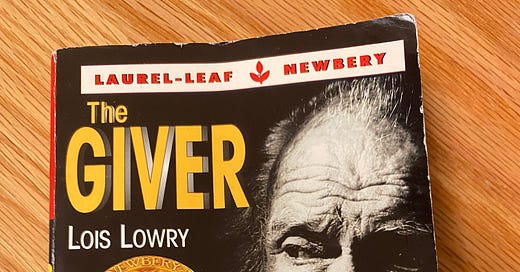Hey there,
First final? ✅.
I have one more on Wednesday, and I’ll take off from Urbana-Champaign until January.
You know when you’re studying hard and need to take a break. Well, I have a book with me. Instead of going on my phone to check the non-existing social media apps (they’ve been deleted) I read my book.
This week, I finished reading one of these backpack books called The Giver. I’ve never heard of the book but a “deer” friend recommend it to me so I gave it try.
Here we go, Curiosities on The Giver.
Curiosities on The Giver 🧏♂️💊😵
1. What’s The Giver about?
Before I tell you what I learned, let me give you a brief recap.
What’s the book about? A story of a regulated society of sameness where everybody thinks, looks, and acts the same. A stoic society where crime and sadness do not exist.
When kids reach 12, they’re assigned their jobs, which they will do for the rest of their lives ranging from engineers and caregivers to entertainers to birthmothers. Absolutely EVERYTHING is chosen for you. From your parents to your partner.
Interesting? Let’s continue.
2. Precision of Language
In the story, people aren’t allowed to be vague with their words. They aren’t allowed to say popular idioms like “I’m starving” when they’re hungry.
Why?
Once, when he had been a Four, he had said, just prior to the midday meal at school, “I’m starving.” Immediately he had been taken aside for a brief private lesson in language precision.
He was not starving, it was pointed out. He was hungry. No one in the community was starving, had ever been starving, would ever be starving.
To say “starving” was to speak a lie. An unintentioned lie, of course. But the reason for precision of language was to ensure that unintentional lies were never uttered.
― From The Giver
This stuck with me because I’ve learned to be careful with my words. Words have power and will make things happen whether you intended it or not.
So much of our society is built upon these vague and imprecise phrases like “I’m dying” when laughing, “I’m angry” when bothered, or “I’m sad” when feeling under the weather.
Even if you’re joking, this shapes your world. Ever joked about getting (or not getting) that outcome? And, you got it. That’s what I’m talking about. Here’s a good thread on this idea.
3. Pills, Pills, and Pills
Sick? Take a pill. Can’t concentrate? Take a pill. Sad? Take a pill. Feel like it? Take a pill.
Pills, pills, everywhere, and not a questioning mind asking why you feel like that in the first place.
In The Giver, a similar idea occurs. Everyone takes a pill to avoid the so-called Stirrings. Basically feelings of love, affection, excitement, etc. In this society, people believe it’s a bad thing to have those feelings so they “pill” themselves. Somehow, these people don’t question a single BIT of it.
It turns out, we've gotten close (or already got there) to this society. Instead of asking, “Why does my head hurt?” A pill will do. Never questions like, “Were you on your computer for too long?” or, “Were you reading at night?”
Or “why can’t I concentrate?” You go to the doctor, you get diagnosed, and you start taking pills to focus. Never questions like, “Am I being disciplined?” “Why should I be interested in this?”, or “Am I sleeping, eating, exercising correctly?”
4. Emotions are felt, never told.
"I felt sad today," he had heard his mother say, and they had comforted her.
But now Jonas (the protagonist) had experienced real sadness. He had felt grief. He knew there was no quick comfort for emotions like those.
These were deeper and did not need to be told. They were felt.
― From The Giver
Mic drop….
How much of our society leans on the self-indulgence of self-talk, self-love, and self-everything?
How is this inward overfocus affecting the world outside of our heads?
5. Fiction Books. Have Recs?
There is a unique and mysterious way where lessons, beauty, and wonder are intertwined in stories, especially in these fiction books.
During high school, I read about 200 books. Almost all of them, except Snow Crash, were nonfiction.
If you had to read one fiction book for the rest of your life, which one would it be?
Let me know by replying to this email, or by sending me a tweet @jdcampolargo.
Ciao,
Juan David Campolargo




